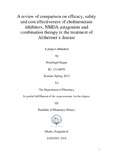| dc.contributor.advisor | Kabir, Md. Tanvir | |
| dc.contributor.author | Haque, Mushfiqul | |
| dc.date.accessioned | 2019-01-02T09:32:33Z | |
| dc.date.available | 2019-01-02T09:32:33Z | |
| dc.date.copyright | 2018 | |
| dc.date.issued | 2018-08 | |
| dc.identifier.other | ID 13146070 | |
| dc.identifier.uri | http://hdl.handle.net/10361/11070 | |
| dc.description | This project report is submitted in partial fulfilment of the requirements for the degree of Bachelor of Pharmacy, 2018. | en_US |
| dc.description | Catalogued from PDF version of project report. | |
| dc.description | Includes bibliographical references (page 55-66). | |
| dc.description.abstract | Alzheimer’s disease (AD), a deadly neurodegenerative disease, which is considered as one of the top causes of death for people who are over 65 years of age. Up until now, no drug has been developed that can cure this disease but a number of drugs have been developed that can modify the disease condition. Currently, cholinesterase inhibitors – tacrine, donepezil, rivastigmine, galantamine and NMDA antagonist – memantine are approved for the treatment of Alzheimer’s disease. We reviewed the evidences behind efficacy and safety of these drugs by searching journal articles from Embase, PubMed and Google Scholar. We used placebo controlled trials and comparative trials for this purpose. Moreover, we also compared the costs of treatment with these drugs. Review of the articles suggested that cholinesterase inhibitors have positive effects in improving cognition and behavior and that there is no statistically significant difference between the efficacy cholinesterase inhibitors in treating mild to moderate Alzheimer’s disease. Donepezil has been found to have lowest incidences of adverse drug events and highest for tacrine. On the other hand, memantine has been found to improve not only cognitive functions but also to prevent further neurodegeneration in moderate to severe AD patients. It has great beneficial effects on Severe Impairment Battery (SIB) scores and also on Alzheimer’s disease Cooperative Study – Activities of Daily Living (ADCS-ADL). In terms of adverse drug events, studies have suggested that memantine has moderate safety and tolerability. Another strategy for managing AD is the combination therapy of cholinesterase inhibitors and memantine. It is efficacious in managing moderate to severe AD and does not cause higher incidences of adverse events in comparison to treatment where cholinesterase inhibitor is used alone. Comparison of costs of drugs, have suggested donepezil to be better choice for treatment of mild to moderate AD and memantine for moderate to severe AD. | en_US |
| dc.description.statementofresponsibility | Mushfiqul Haque | |
| dc.format.extent | 66 pages | |
| dc.language.iso | en | en_US |
| dc.publisher | BRAC University | en_US |
| dc.rights | BRAC University project reports are protected by copyright. They may be viewed from this source for any purpose, but reproduction or distribution in any format is prohibited without written permission. | |
| dc.subject | Alzheimer’s disease | en_US |
| dc.subject | Cholinesterase inhibitors | en_US |
| dc.subject | NMDA antagonists | en_US |
| dc.subject | Combination therapy | en_US |
| dc.subject | Efficacy | en_US |
| dc.subject | Cost effectiveness | en_US |
| dc.title | A review of comparison on efficacy, safety and cost effectiveness of cholinesterase inhibitors, NMDA antagonists and combination therapy in the treatment of Alzheimer’s disease | en_US |
| dc.type | Project report | en_US |
| dc.contributor.department | Department of Pharmacy, BRAC University | |
| dc.description.degree | B. Pharmacy | |

